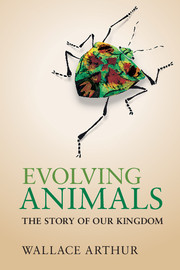Book contents
- Frontmatter
- Dedication
- Contents
- Preface
- Acknowledgements
- 1 What is an animal?
- 2 Before there were animals
- 3 How to make a fossil
- 4 The Cambrian explosion
- 5 How to make a species
- 6 Jellyfish and their kin
- 7 How to make a tree
- 8 The enigmatic urbilaterian
- 9 Animal symmetry and heads
- 10 A plethora of worms
- 11 Trends in animal complexity
- 12 Where the octopus is king
- 13 How to make an animal
- 14 Exoskeletons galore
- 15 Extinction
- 16 Mouth first, mouth second
- 17 Comparing embryos
- 18 Larvae, mouthparts and moulting
- 19 The animal toolkit
- 20 Vertebrate origins and evolution
- 21 From water to land to water
- 22 Variation and inheritance
- 23 Evolutionary novelties
- 24 Human origins and evolution
- 25 Animal plasticity
- 26 The nature of adaptation
- 27 The direction of evolution
- 28 Animal extremophiles
- 29 Extraterrestrial animals?
- 30 The ghost in the machine
- Appendix
- References
- Index
11 - Trends in animal complexity
Published online by Cambridge University Press: 05 August 2014
- Frontmatter
- Dedication
- Contents
- Preface
- Acknowledgements
- 1 What is an animal?
- 2 Before there were animals
- 3 How to make a fossil
- 4 The Cambrian explosion
- 5 How to make a species
- 6 Jellyfish and their kin
- 7 How to make a tree
- 8 The enigmatic urbilaterian
- 9 Animal symmetry and heads
- 10 A plethora of worms
- 11 Trends in animal complexity
- 12 Where the octopus is king
- 13 How to make an animal
- 14 Exoskeletons galore
- 15 Extinction
- 16 Mouth first, mouth second
- 17 Comparing embryos
- 18 Larvae, mouthparts and moulting
- 19 The animal toolkit
- 20 Vertebrate origins and evolution
- 21 From water to land to water
- 22 Variation and inheritance
- 23 Evolutionary novelties
- 24 Human origins and evolution
- 25 Animal plasticity
- 26 The nature of adaptation
- 27 The direction of evolution
- 28 Animal extremophiles
- 29 Extraterrestrial animals?
- 30 The ghost in the machine
- Appendix
- References
- Index
Summary
A pervasive theme that has been with us since the beginning of the book – sometimes explicitly, other times implicitly – is that more complex animals are not necessarily more ecologically successful than simple ones. Indeed, this theme first emerged (Chapter 1) in a broader context than the animal kingdom – the context of life in general. The very first life-forms on Earth were probably rather like today’s bacteria. The fact that bacteria and other unicellular forms continue to prosper attests to the fact that you don’t have to be a big, complex organism to be fit – in the evolutionary sense of the word, as explained in Chapter 5. This point was reinforced in the previous chapter when we noted the incredible ecological success of roundworms, most of the 25,000 species of which are small and, in structural terms, quite simple, compared, for example, to arthropods or vertebrates.
It was this point (among others) that led me to state, at an early stage in the book, that evolution is not an escalator, up which creatures go at varying rates to higher levels of complexity. Some evolutionary lineages have shown rises in complexity over geological time, but others have not. Some have even shown decreases in complexity.
- Type
- Chapter
- Information
- Evolving AnimalsThe Story of our Kingdom, pp. 104 - 112Publisher: Cambridge University PressPrint publication year: 2014



